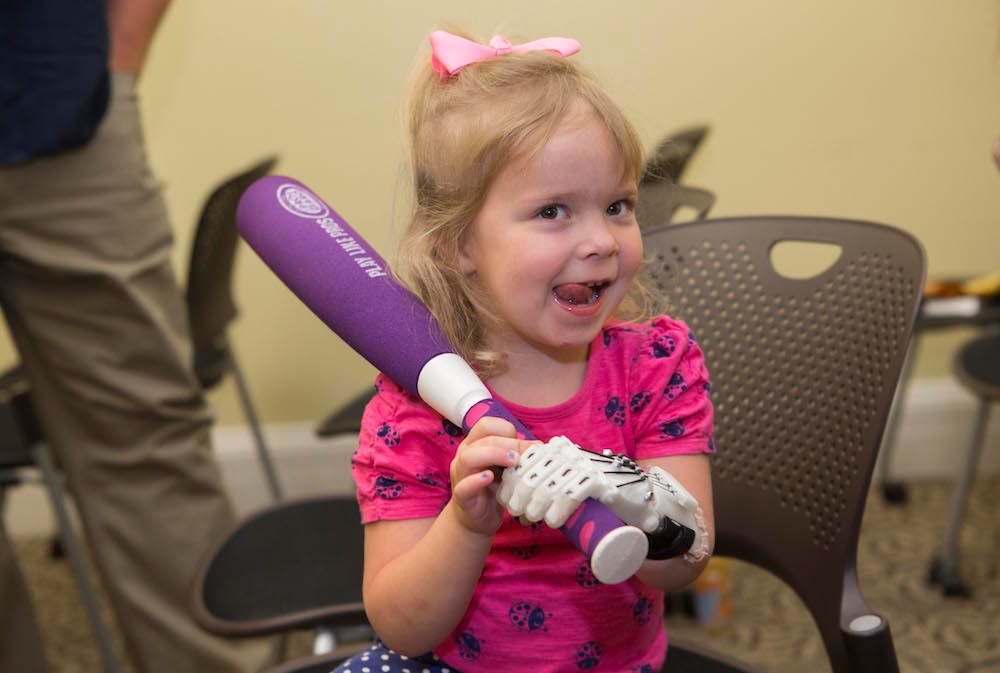Ella Morton, 3, shows off her new 3-D printed prosthetic hand created by the UC student group EnableUC. Photo/Joseph Fuqua II/UC Creative Services
UC's engagement edge
46,000 volunteers + 700,000 hours = $8.5M impact thanks to UC's volunteer activities and community engagement
By M.B. Reilly
513-556-1824
April 18, 2017
A first-ever pilot study of the annual economic value of the University of Cincinnati’s volunteer service and engagement finds that students, staff and faculty annually contribute the equivalent of $8.5 million in time, talent and philanthropic donations to our local, regional and global communities.
The study by UC’s Economics Center and presented at today’s Board of Trustees meeting examined university student, staff and faculty volunteer pro-bono activities in the 2015-16 academic year and also broke those activities down by college.
The gamut of activities is as diverse as our campus: writing workshops for veterans, free health screenings, children’s dental care, theater projects, sustainability efforts, legal clinics, sports programs and many more. These engagement efforts add up:
- About 46,000 of UC’s approximately 55,000 students, staff and faculty annually work to engage with the community, volunteer and/or engage in financial philanthropy to advance causes and nonprofit organizations as part of their campus membership and role.
- They donate more than 700,000 hours annually toward organizations, groups, and causes they care about.
- This represents the equivalent of more than 300 full-time volunteers providing nearly 90,000 total working days.
- The annual financial value of this volunteerism comes to $8.5 million.
Individual impact: A hand up
One anecdote is worth a thousand words — or even $8.5 million dollars.
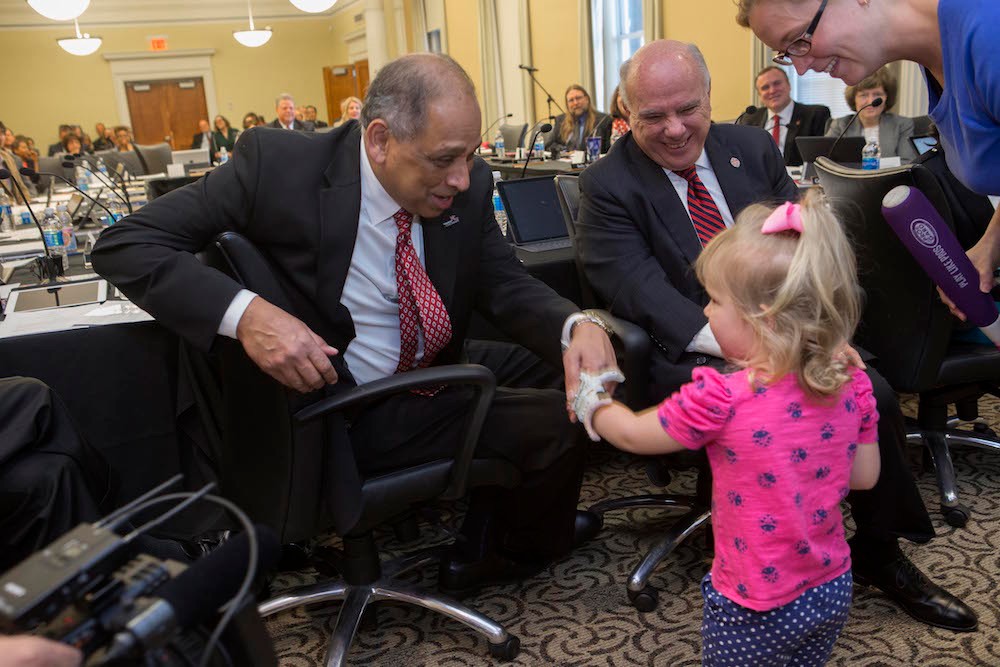
Ella Morton, 3, shakes hands with UC President Neville Pinto and meets UC Board of Trustees Chair Thomas Cassady (right). At far right is Ella's Mom, Heather Morton. Photo/Joseph Fuqua II
And as such, the $20 prosthetic created for 3-year-old Ella Morton deftly illustrates the human face behind a just-released pilot study on the collective annual $8.5 million financial value of the University of Cincinnati’s community engagement activities and volunteerism. That engagement is represented by philanthropy, local service, international outreach and research.
Ella, who lacks most of her left hand due to a birth defect, darted to the front of the room during the UC Board of Trustees meeting April 18 and proudly waved to the crowd using her new prosthetic hand. Thanks to the work of EnableUC, a UC student group from the College of Engineering and Applied Science, she can now grip a ball, hold a bat and even shake hands simply by bending her wrist.
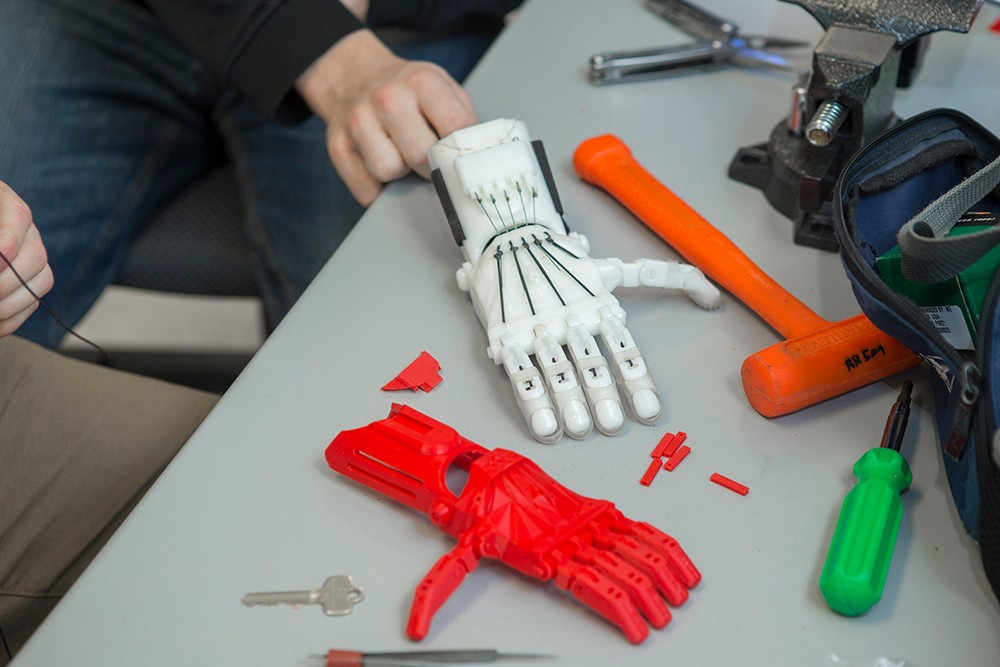
EnableUC designs and provides affordable 3-D printed prosthetic devices for those in need and has printed 46 similar prosthetics in the last 18 months. Ella’s mom, Heather Morton, herself a mechanical engineer, was searching online when she discovered the student group that ultimately made an enormous impact on their family.
Study specifics
According to Brad Evans, associate director of research, who helped conduct the economic value study, “We looked at work by members of the UC community on behalf of others. We tallied volunteer activities that would not have been done except for the faculty, staff or students’ affiliation with UC.”
Evans conducted the study in partnership with Chris Nicak, associate director of research, who added that the benefit of campus’ community engagement goes far beyond economic value. “The argument could be made that UC and its students are building character as we build up our community,” Nicak said. “Our collective community awareness pays off through civic duty and valuable experience whether that comes from time giving to local charities, nonprofits or faith-based organizations.”
The number and variety of organizations, programs, causes and efforts that UC faculty, staff and students volunteer toward is too many to enumerate, however, here is a sampling:
Become a Bearcat
Apply online or get more information about undergraduate enrollment by calling (513) 556-1100.
See more information about studying biomedical engineering at UC, whether on the undergraduate or graduate level.
UC Serves
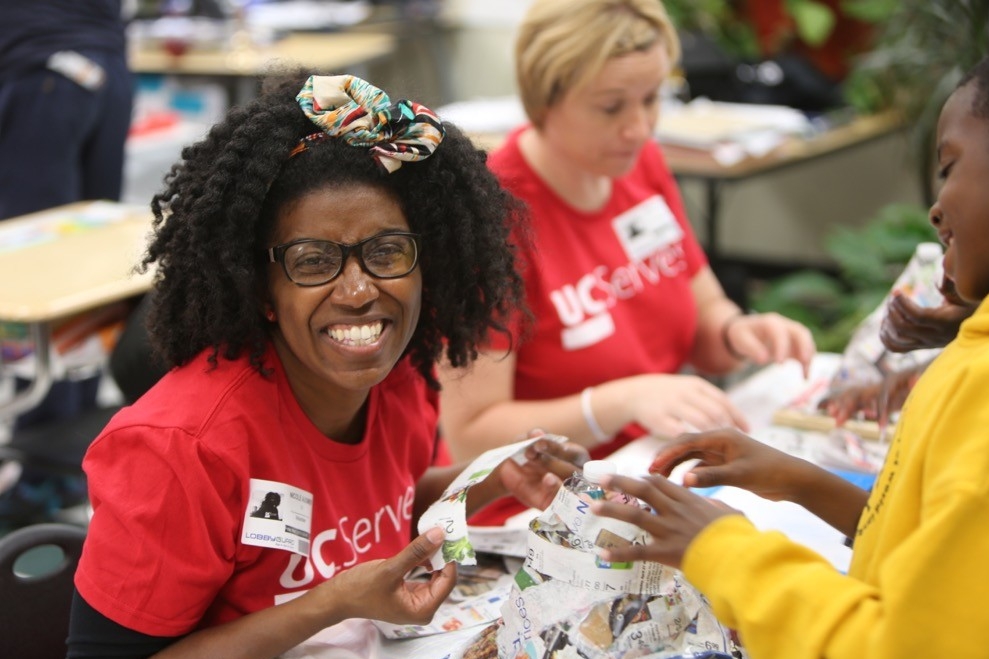
UC Serves, to be held on May 19, is an annual event allowing faculty and staff to give back to the community via projects like home repairs for the elderly or disabled, beautification projects as well as outreach to schools and other non profits.
Dadaab Theater Project
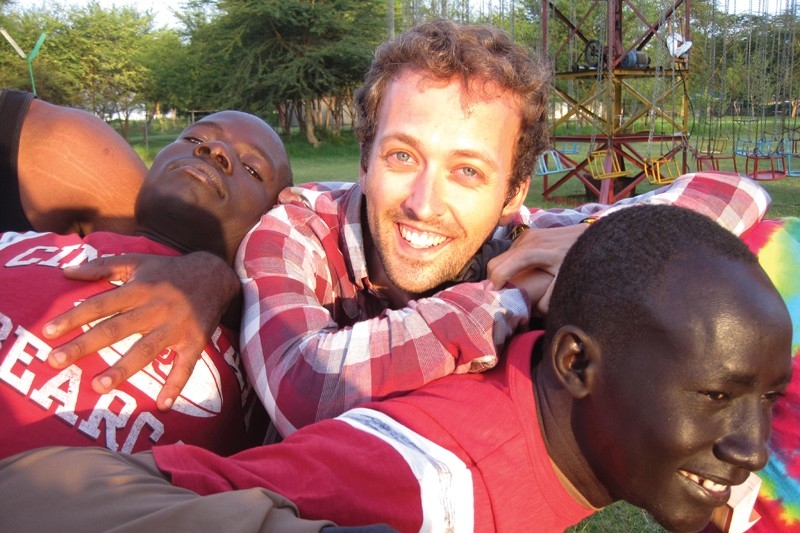
The Dadaab Theatre Project brings together faculty and students with refugees in Africa for a shared curtain call that creates connections via powerful art and acting performances.
The Cincinnati Project
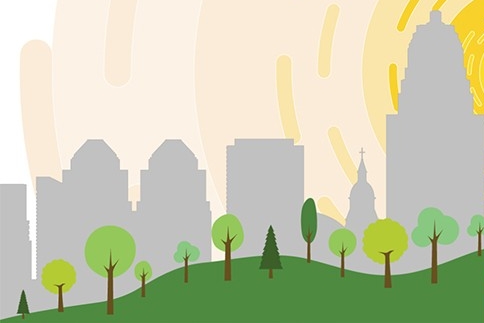
The Cincinnati Project enlists more than 170 faculty and students in conducting research on issues like health disparities and educational inequalities, as well as poverty-related issues and improved conditions for women, among others.
Mentoring foster kids
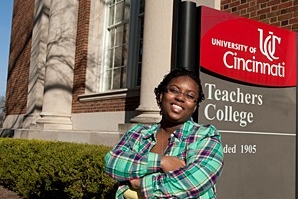
UC is part of an award-winning partnership that opens the door to college for youth aging out of the foster care system. Only 3 percent of foster youth achieve college degrees, and the Higher Education Mentoring Initiative seeks to change that by, among other efforts, teaming these youth with a higher ed mentor for a six-year commitment.
$martPath
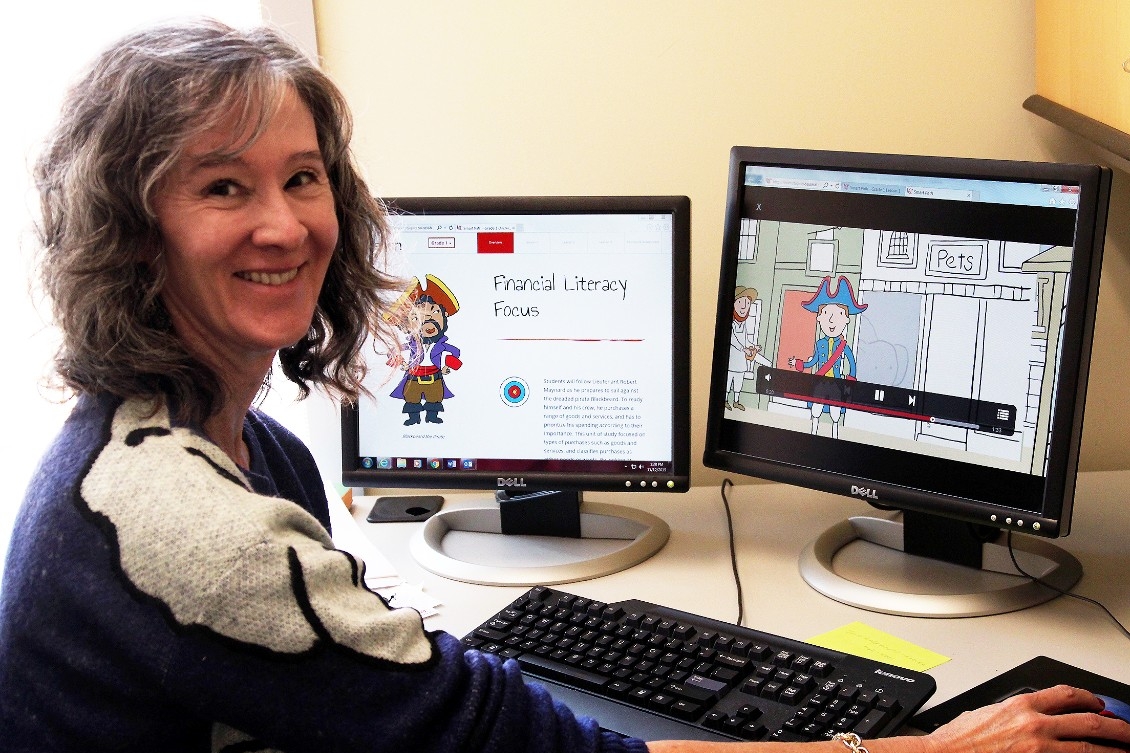
UC’s Economics Center provides financial and economic education to students in grades K-12, including an ambitious, widely used innovative software program called $martPath. Developed by the center, it is offered free of charge to students and educators around the globe and makes use of colorful characters and settings to engage students to build their skills in math and in financial basics.
Village Life Outreach
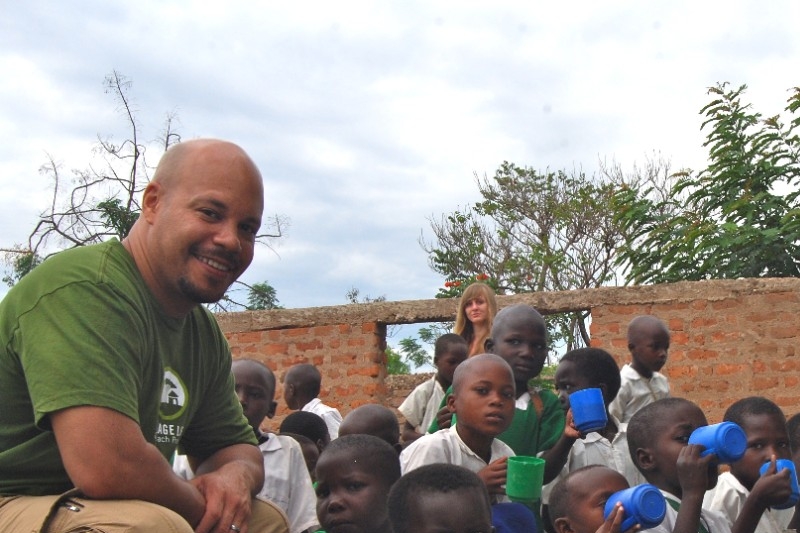
UC is bringing health care and education closer to home for a rural area of Tanzania via the design and construction of a clinic and school. Before the completion of this project, anyone (including pregnant women) wanting medical care in the Tarime region, surrounding the community of Roche, Tanzania, had to walk for miles to reach the nearest city.
Back to Business
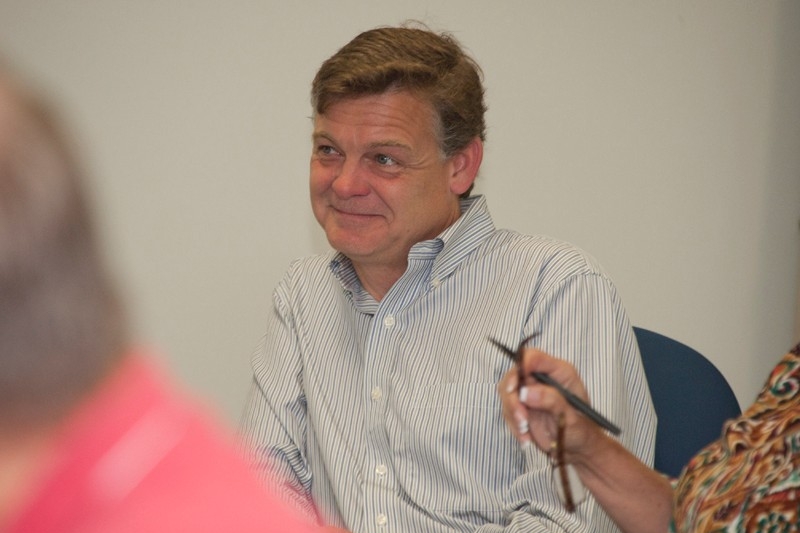
UC’s Back to Business program allows displaced professionals to update their skills. The program, offered through the UC Carl H. Lindner College of Business, is free for those who complete the course.
Ohio Innocence Project
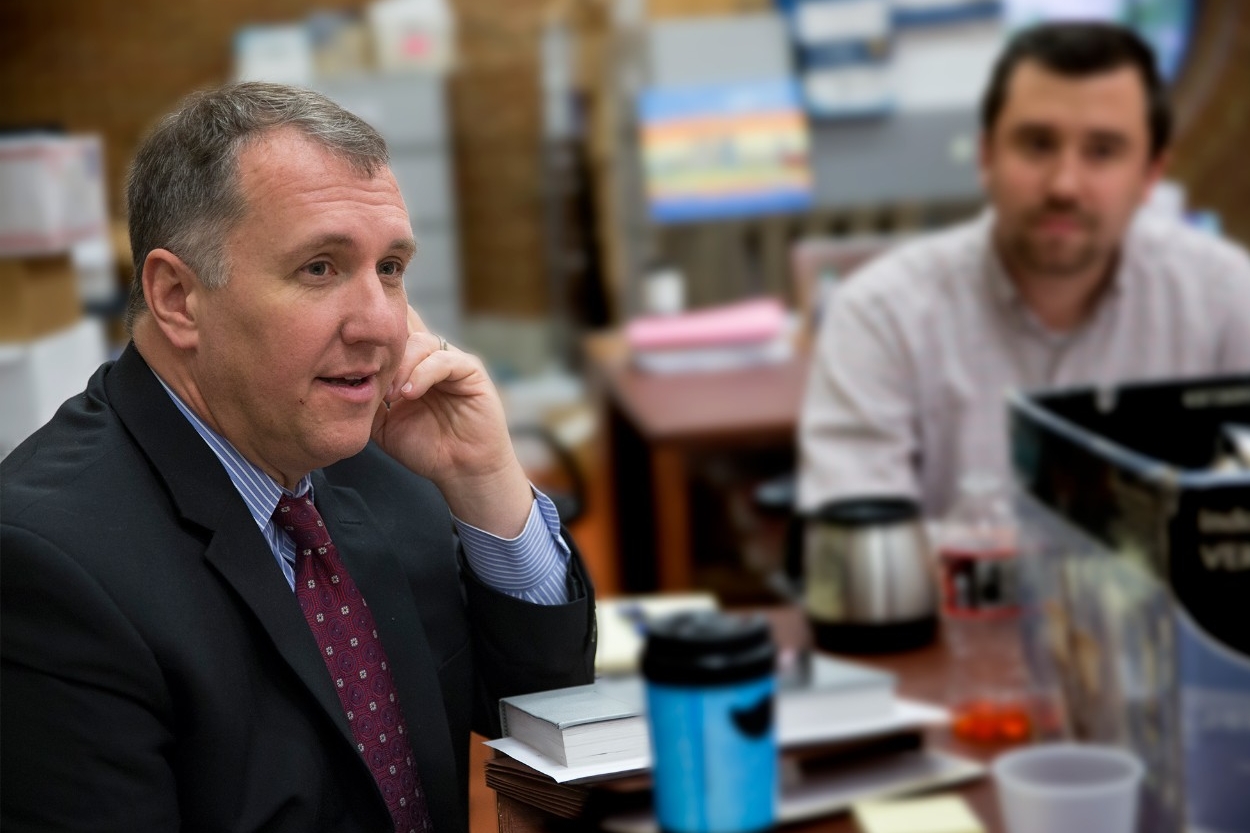
The Ohio Innocence Project seeks to exonerate the wrongly convicted and imprisoned. To date, the OIP in UC’s Lois and Richard Rosenthal Institute for Justice has freed two dozen wrongfully convicted inmates from Ohio prisons who together had served more than 450 years for crimes they did not commit.
The Cincinnati Exchange Project
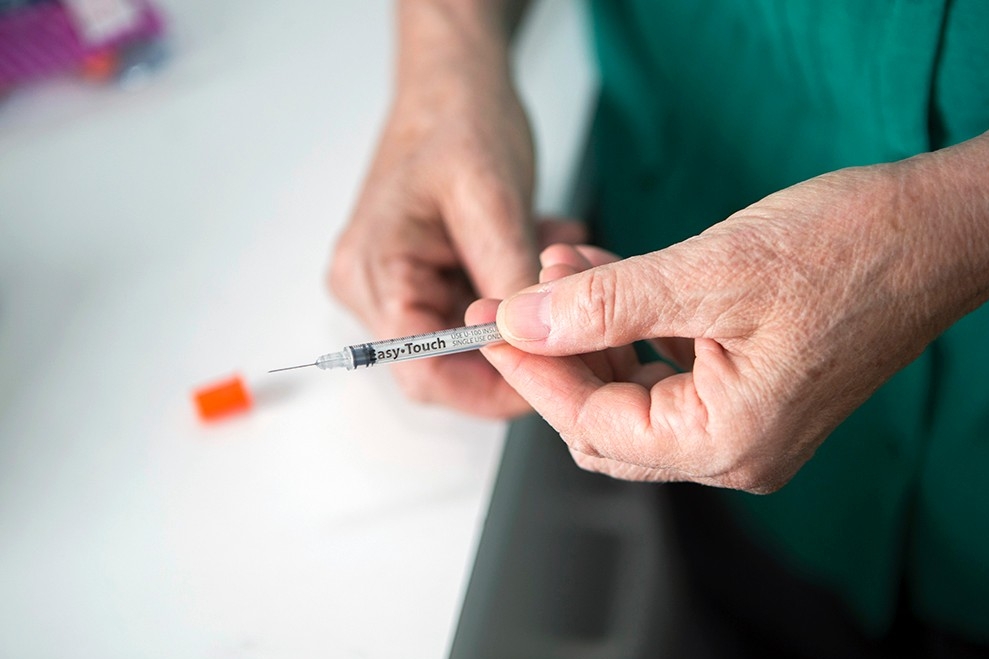
The Cincinnati Exchange Project is taking on the heroin epidemic and helping to stop infectious disease one needle at a time.
See the full report online
Note: The study examined the impact of volunteer activities and community engagement. It did not examine the economic impact of UC’s operations, capital expenditures and employment.

